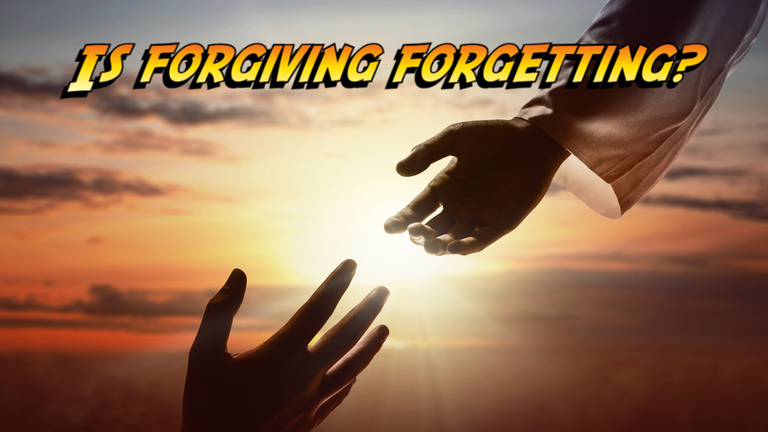[EN/PT] Is Forgiving Forgetting?
[EN]

Let he who is without sin cast the first stone. This phrase, found in the Holy Bible, reminds us that every human being is prone to mistakes. Every mistake has consequences, both for those who make them and for those who are harmed by them. Often, it is necessary to acknowledge the mistake and overcome it. For those who err, this means repentance and change; for those who suffer, it means deciding whether or not to grant forgiveness.
Forgiveness is a noble act, but it is not always easy. It is difficult to offer forgiveness to those who have hurt us physically, psychologically, or financially, among other ways. Those who suffer physical aggression, for example, will hardly forget the pain or the marks left on their bodies and in their memories. The person may even forgive, but the memories remain alive.
For this reason, “forgiving and forgetting” do not always go hand in hand. This raises the question: what if true forgiveness were only possible when accompanied by forgetting? Forgiveness is something sublime, but for genuine forgetting to exist, it is necessary for the person who made the mistake to sincerely acknowledge their fault and commit to not repeating it.
Imagine a couple in which the husband cheated on his wife. After the discovery, they argue and separate. Some time later, the wife decides to get back together because she still loves him. This decision, however, is risky, as trust has been broken. Any argument could bring back memories of the betrayal. If the husband does not truly repent, there is a good chance he will make the same mistake again. In this scenario, the wife will not have fully forgiven him, as she will continue to use the past as an argument in fights, and the husband will not have changed his behavior.

For forgiveness to be genuine, it is essential that the forgiver is willing not to use the mistake as a constant weapon and that the offender deeply acknowledges their fault and does not repeat it. When only one party acts in this way, the relationship is unlikely to remain healthy. If the mistake continues to be repeated, the other person may forgive, but will be forced to distance themselves to avoid further hurt. In this situation, forgiveness may exist, but harmonious coexistence is no longer possible.
The wounded person is like a broken crystal. No matter how much the pieces are glued together, it will never return to its previous form. Perhaps it will become a patched crystal, with scars that hold the memory of pain. It may even forgive with all its heart, but inside, it will still carry marks that will never fade.
Therefore, forgiveness is a profound gesture that requires courage, maturity, and empathy, but it only becomes complete when accompanied by genuine repentance on the part of the wrongdoer and a willingness to move on on the part of the victim. It may be impossible to forget completely, as experiences shape who we are, but it is possible to allow the memory of the mistake to cease to hurt. Thus, forgiveness does not erase the past, but it frees the present and opens space for a less burdensome future.
If you've made it this far, thank you very much for your time, and if this content was useful in any way, please leave your upvote and reblog!

[PT]

Quem nunca errou que atire a primeira pedra. Essa frase, presente na Bíblia Sagrada, nos lembra que todo ser humano está sujeito a falhas. Todo erro traz consequências, tanto para quem o comete quanto para quem é prejudicado. Muitas vezes, é necessário reconhecer o erro e superá-lo. Para quem erra, isso significa arrependimento e mudança; para quem sofre, significa decidir se vai ou não conceder o perdão.
Perdoar é um ato nobre, porém nem sempre simples. É difícil oferecer perdão a quem nos feriu física, psicológica ou financeiramente, entre outras formas. Quem sofre uma agressão física, por exemplo, dificilmente esquecerá a dor ou as marcas deixadas no corpo e na memória. A pessoa pode até perdoar, mas as lembranças permanecem vivas.
Por esse motivo, “perdoar e esquecer” nem sempre caminham juntos. Surge então a reflexão: e se o perdão verdadeiro só fosse possível quando acompanhado do esquecimento? O perdão é algo sublime, mas para que exista um esquecimento genuíno, é necessário que quem errou reconheça sinceramente sua falha e se comprometa a não repeti-la.
Imagine um casal em que o marido traiu a esposa. Após a descoberta, eles discutem e se separam. Algum tempo depois, a esposa decide reatar porque ainda o ama. Essa decisão, contudo, é arriscada, pois a confiança foi rompida. Qualquer discussão poderá trazer de volta a lembrança da traição. Se o marido não se arrepender de verdade, há grandes chances de que volte a cometer o mesmo erro. Nesse cenário, a esposa não terá perdoado plenamente, já que continuará a usar o passado como argumento nas brigas, e o marido não terá mudado sua conduta.

Para que o perdão seja verdadeiro, é essencial que quem perdoa esteja disposto a não usar o erro como arma constante e que quem errou reconheça profundamente sua falha e não a repita. Quando apenas uma das partes age nesse sentido, a relação dificilmente se mantém saudável. Se o erro continua sendo repetido, a outra pessoa pode até perdoar, mas será obrigada a se afastar para evitar novas feridas. Nessa situação, o perdão até pode existir, mas a convivência harmoniosa deixa de ser possível.
A pessoa ferida se assemelha a um cristal quebrado. Por mais que as partes sejam coladas, ele nunca voltará a ter a mesma forma de antes. Talvez se transforme em um cristal remendado, com cicatrizes que guardam a memória da dor. Pode até perdoar de todo o coração, mas, por dentro, ainda carregará marcas que jamais se apagam.
Portanto, perdoar é um gesto profundo que exige coragem, maturidade e empatia, mas só se torna pleno quando acompanhado de arrependimento genuíno por parte de quem errou e da disposição de seguir em frente por parte de quem sofreu. Esquecer por completo talvez seja impossível, pois as experiências moldam quem somos, mas é possível permitir que a lembrança do erro deixe de ferir. Assim, o perdão não apaga o passado, mas liberta o presente e abre espaço para um futuro menos pesado.
Se chegou até aqui muito obrigado pelo seu tempo e se de alguma forma este conteúdo foi útil, deixe seu upvote e reblog!

Posted Using INLEO

Obrigado por promover a comunidade Hive-BR em suas postagens.
Vamos seguir fortalecendo a Hive
Forgiving and forgetting is not easy. I have immense respect for those matured enough to do the two.
People can forgive but expecting them to forget is another thing, I don't believe anyone can forget any grievous offence committed unto them. They may not bring it up again, but the memory will always be there.
É como dizem, perdoar é para os fortes, porque não é fácil perdoar algumas coisas e seguir em frente, é preciso abrir mão de muita coisa, então com isso sabemos que perdoar exige mesmo que a gente queira deixar isso de lado e decida seguir em frente